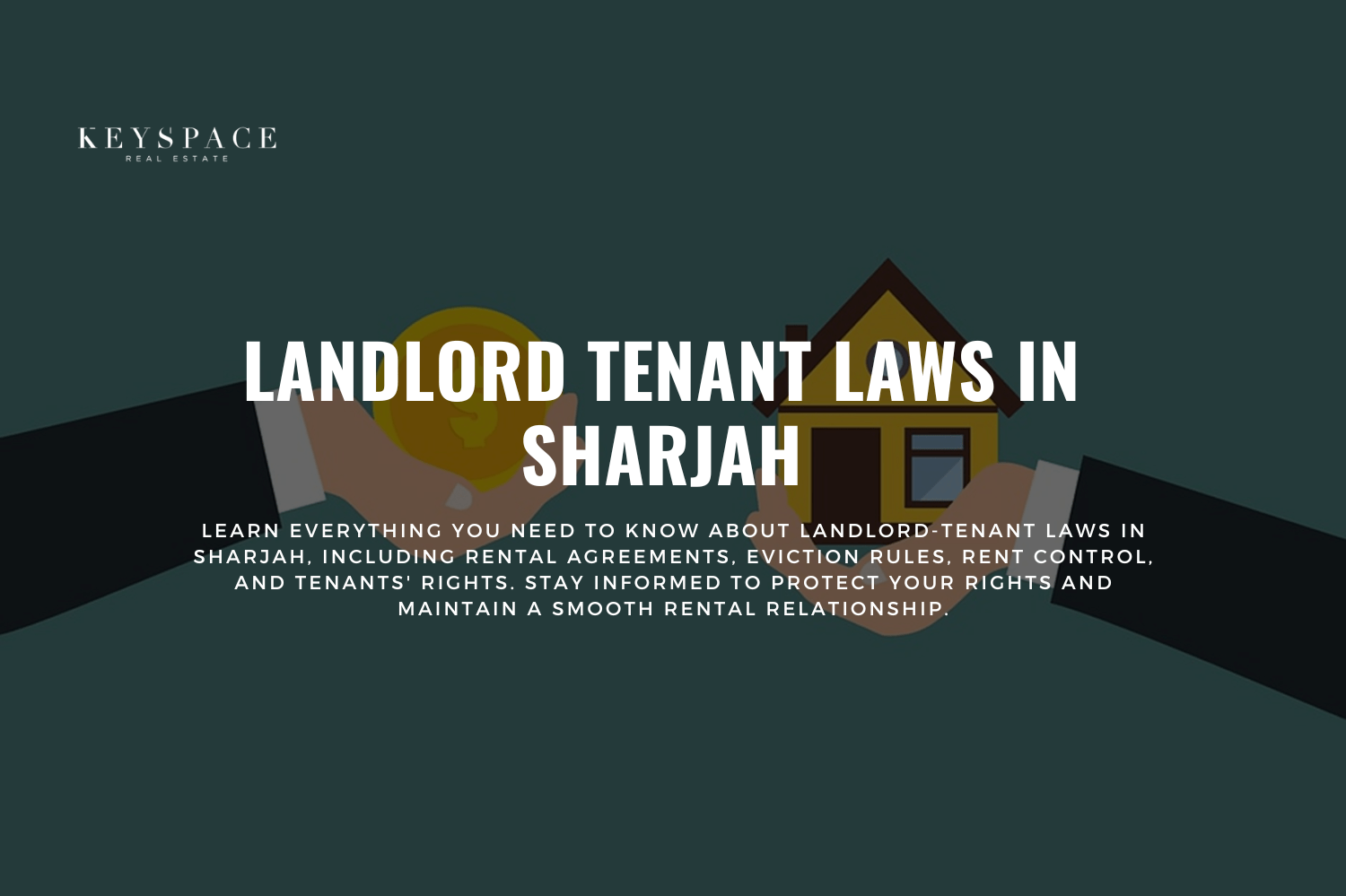Sharjah’s real estate sector with strong tenancy law Dubai has experienced significant growth over the years, making it an attractive destination for both landlords and tenants.
Whether you are renting an apartment or managing rental properties, understanding the local legal framework is essential.
This article will dive deep into the key regulations governing landlord-tenant relationships in Sharjah, focusing on rental agreements, rights, obligations, and dispute resolution.
Key Regulations Governing Tenancy Law Dubai In Sharjah
The landlord-tenant relationship in Sharjah is regulated by various laws to ensure fairness and clarity for both parties.
The Sharjah Municipality plays a critical role in overseeing these regulations, ensuring all rental agreements follow legal protocols.
Rent regulation and contract enforcement are crucial aspects of this legal framework, helping maintain a balanced relationship between landlords and tenants.
Sharjah, like other emirates in the UAE, has specific regulations in place to govern the relationship between landlords and tenants.
These regulations aim to protect the rights of both parties and ensure a harmonious living environment. Here are some of the key points to remember:
Lease Agreement
- Mandatory: A written lease agreement is mandatory for all rental properties in Sharjah.
- Terms: The lease agreement should clearly outline the rental amount, duration of the lease, maintenance responsibilities, security deposit, and any other relevant terms.
Rent Increases
- Annual Limit: Landlords can increase the rent annually, but the increase is subject to a government-imposed limit. This limit is typically adjusted each year.
- Notice Requirement: Landlords must give tenants a specified notice period before implementing a rent increase.
Maintenance and Repairs
- Landlord’s Responsibility: Generally, the landlord is responsible for major repairs and maintenance of the property, such as structural issues or plumbing problems.
- Tenant’s Responsibility: Tenants are typically responsible for minor repairs and maintenance, such as changing light bulbs or fixing minor appliances.
Security Deposit
- Limit: The security deposit is usually limited to a specific number of months’ rent.
- Refund: The landlord must refund the security deposit, minus any deductions for damages or unpaid rent, upon the termination of the lease.
Termination of Lease
- Notice Period: Both landlords and tenants must give a specified notice period before terminating the lease, unless there is a breach of contract or other extenuating circumstances.
- Early Termination: If a tenant terminates the lease early, they may be liable for a penalty or early termination fee.
Dispute Resolution
- RERA: The Real Estate Regulatory Authority (RERA) in Sharjah is the governing body for real estate matters. Tenants can file complaints with RERA if they have disputes with their landlords.
- Mediation: RERA often encourages mediation as a means to resolve disputes before resorting to legal action.
It’s important to note that these are general guidelines, and specific regulations may vary. It’s advisable to consult with a legal professional or RERA for detailed information and to ensure compliance with local laws.
Tenancy Contracts In Sharjah
Having a written tenancy agreement is a legal requirement in Sharjah, providing both the landlord and tenant with protection.
These contracts outline the terms of the lease, including rent, duration, maintenance, and responsibilities. Without a contract, it becomes difficult to resolve disputes legally, so it is always advisable to have a clear and detailed agreement.
A tenancy contract is a legally binding agreement between a landlord and a tenant that outlines the terms and conditions of a rental property. In Sharjah, as in other parts of the UAE, having a written tenancy contract is mandatory.
Key Components of a Tenancy Contract
- Parties Involved: Clearly identify the landlord and tenant.
- Property Description: Provide a detailed description of the property, including its address and any specific features.
- Rental Amount: Specify the monthly rental amount and any additional charges (e.g., service charges, utilities).
- Lease Duration: Indicate the start and end dates of the lease.
- Security Deposit: Specify the amount of the security deposit and how it will be refunded.
- Maintenance Responsibilities: Outline who is responsible for maintaining the property (landlord or tenant).
- Rent Payment Terms: Specify the due date for rent payments and any late payment penalties.
- Termination Clause: Indicate the conditions under which either party can terminate the lease and the required notice period.
- Dispute Resolution: Specify the procedure for resolving disputes between the landlord and tenant.
Additional Considerations
- RERA Approval: While not always mandatory, it’s advisable to have the tenancy contract approved by the Real Estate Regulatory Authority (RERA) in Sharjah. This can provide additional protection for both parties.
- Renewal Options: The contract should specify whether there is an option for renewal and the terms for renewal.
- Subletting: If subletting is allowed, the contract should outline the conditions and restrictions.
Components Of A Standard Lease Contract
A standard lease contract in Sharjah typically includes the following essential components:
Parties Involved
- Landlord: The owner of the property.
- Tenant: The individual or entity renting the property.
Property Description
- Address: The complete address of the rental property.
- Description: A detailed description of the property, including its features, amenities, and any specific conditions.
Lease Term
- Start Date: The date the lease agreement begins.
- End Date: The date the lease agreement ends.
- Renewal Options: Whether the lease can be renewed and under what conditions.
Rental Amount
- Monthly Rent: The agreed-upon monthly rental amount.
- Payment Terms: The due date for rent payments and any late payment penalties.
Security Deposit
- Amount: The amount of the security deposit.
- Refund Terms: The conditions under which the security deposit will be refunded, including any deductions for damages or unpaid rent.
Maintenance Responsibilities
- Landlord’s Responsibilities: The landlord’s obligations for repairs and maintenance of the property.
- Tenant’s Responsibilities: The tenant’s obligations for maintaining the property.
Utilities
- Responsibility: Whether the landlord or tenant is responsible for paying utilities.
- Meter Readings: How utility meter readings will be shared and billed.
Subletting
- Permissibility: Whether subletting is allowed and under what conditions.
Termination Clause
- Notice Period: The required notice period for either party to terminate the lease.
- Early Termination: Any penalties or fees associated with early termination.
Dispute Resolution
- Procedure: The method for resolving disputes between the landlord and tenant, such as mediation or arbitration.
Governing Law
- Jurisdiction: The laws that govern the lease agreement, typically the Landlord Tenant Laws of Sharjah.
Signatures
- Both Parties: The signatures of both the landlord and tenant.
These contracts should be registered with the local authorities to be considered legally binding.
Lease Duration And Renewal Conditions
Leases in Sharjah are often either fixed-term or renewable. A fixed-term lease expires after the agreed period, while renewable contracts automatically extend if both parties agree.
Tenants usually have the right to renew their leases unless the landlord provides a legitimate reason to terminate the agreement.
A typical lease agreement in Sharjah specifies a fixed duration, such as one or two years. Upon expiration, the lease may automatically renew for another term if neither the landlord nor the tenant provides written notice to terminate.
However, the renewal terms may be subject to certain conditions, such as an increase in rent or changes to the lease agreement. It’s essential to carefully review the renewal clause in the lease to understand your rights and obligations regarding lease extensions.
Rights And Obligations Of The Landlord
Landlords in Sharjah have the legal right to collect rent on time, expect proper care of the property, and make necessary inspections.
As a landlord in Sharjah, you have certain rights and obligations. Your rights include the right to receive timely rent payments, the right to maintain control of the property, and the right to require the tenant to abide by the terms of the lease agreement.
However, you also have obligations, such as ensuring the property is habitable, providing necessary repairs and maintenance, and respecting the tenant’s privacy.
Key Landlord Obligations:
- Habitability: Ensure the property is in a safe and habitable condition.
- Maintenance: Address necessary repairs and maintenance issues promptly.
- Privacy: Respect the tenant’s privacy and avoid unauthorized access to the property.
- Rent Collection: Collect rent payments on time and in accordance with the lease agreement.
- Security Deposit: Handle the security deposit appropriately, refunding it at the end of the lease minus any deductions for damages or unpaid rent.
- Compliance: Adhere to local landlord tenant laws and regulations regarding landlord-tenant relationships.
By understanding your rights and obligations as a landlord, you can help ensure a positive and mutually beneficial tenancy relationship.
However, they are also responsible for the maintenance of the property. Major repairs that affect the tenant’s comfort or safety should be addressed by the landlord promptly.
Tenant’s Rights And Obligations
Tenants must respect the terms of the lease, pay rent on time, and take good care of the rented property. They also have the right to live in a property that is safe and well-maintained.
As a tenant in Sharjah, you have certain rights and obligations. Your rights include the right to a habitable property, the right to quiet enjoyment of the premises, and the right to privacy.
However, you also have obligations, such as paying rent on time, maintaining the property in a reasonable condition, and complying with the terms of the lease agreement. Understanding your rights and obligations is crucial for ensuring a positive tenancy experience.
As a tenant in Sharjah, you have certain rights and obligations. Your rights include:
- Habitability: The right to a safe and habitable living environment.
- Quiet Enjoyment: The right to enjoy the property without unreasonable interference from the landlord or other tenants.
- Privacy: The right to privacy within your rental unit.
- Notice: The right to receive proper notice for rent increases, inspections, or lease terminations.
However, you also have obligations, such as:
- Rent Payment: Paying rent on time and in full, according to the terms of the lease agreement.
- Maintenance: Maintaining the property in a reasonable condition, excluding normal wear and tear.
- Compliance: Complying with the terms of the lease agreement and any applicable laws and regulations.
- Quiet Enjoyment: Ensuring that your actions do not disturb other tenants or the landlord.
By understanding your rights and obligations, you can help maintain a positive tenancy relationship and avoid disputes with your landlord.
If the landlord fails to fulfill their maintenance obligations, tenants can file a complaint with the municipality.
Rent Control And Regulation In Sharjah
Sharjah’s rent control laws are designed to prevent unreasonable rent hikes. Landlords are required to follow specific regulations if they wish to increase rent, typically after the lease term ends.
While Sharjah does not have strict rent control laws like some other jurisdictions, it does have regulations in place to protect tenants from excessive rent increases.
These regulations often include annual limits on rent increases and require landlords to provide tenants with adequate notice before implementing such increases.
Additionally, RERA (Real Estate Regulatory Authority) plays a role in overseeing the rental market and addressing tenant complaints related to rent disputes.
Rent increases should be within the limits set by the local authorities, and landlords must provide advance notice before any changes.
Process For Rent Disputes
Rent disputes are not uncommon in Sharjah, but fortunately, there is a clear process for resolving them.
There are many technicalities involved in the process of renting a property in Sharjah. The relationship between landlords and tenants is very important and may be affected by a mere discrepancy.
However, with the help of RDC, any such dispute can be resolved easily with the abidance of the law. Here’s how the process works.
- Present necessary documents and proof at the RDC office to initiate the rental dispute case.
- A tenancy contract must be legally recognized to proceed with the case. There is a proper process for the attestation of the rental contract in Sharjah.
- After gathering all the supporting documents, fill out the rental dispute complaint form. Inquire about the fee structure to initiate your case.
- The resolution of the rental dispute may be pursued with a meditation session or a hearing. This depends on the discretion of the RDC and the nature of the rental dispute.
- The next step is the issuance of the RDC decision on the dispute. It is legally required by either party to settle the dispute, according to the RDC decision.
All such cases are dealt with as per Sharjah tenancy laws. For a smooth dispute resolution, every party involved in the tenancy contract should have all relevant legal awareness.
If a tenant and landlord cannot agree on rent or maintenance issues, they can approach the Sharjah Rent Committee. This body is responsible for hearing complaints and making fair rulings based on the law.
Eviction Rules And Guidelines
Eviction in Sharjah must follow legal procedures, and landlords cannot evict tenants without cause.
Some valid reasons for eviction include non-payment of rent, misuse of the property, or the landlord needing the property for personal use. Landlords must provide adequate notice before initiating an eviction.
While the case for residential properties, a minimum of fifteen days after the due date should pass before the landlord evicts the tenant. Commercial properties have a minimum of 30 days after their rent due date before they get ousted from their location.
Emergency Situations Leading To Immediate Eviction
In certain situations, landlords may be able to evict tenants immediately. These include cases where the tenant violates the terms of the lease or engages in illegal activities that endanger the property or its occupants.
While Sharjah generally requires a notice period before eviction, certain emergency situations may warrant immediate eviction. These typically involve circumstances that pose a significant threat to the safety or well-being of others.
Here are some examples of emergency situations that could lead to immediate eviction:
- Dangerous Conditions: If the tenant creates dangerous conditions within the property, such as hoarding hazardous materials or engaging in activities that pose a fire hazard.
- Drug Manufacturing or Possession: If illegal drug activities are taking place on the property.
- Violent Behavior: If the tenant engages in violent or threatening behavior towards the landlord, other tenants, or property staff.
- Health Hazards: If the tenant’s actions create health hazards for others, such as unsanitary conditions or the presence of pests.
- Criminal Activity: If the tenant is involved in criminal activities that endanger the safety of others.
It’s important to note that even in these emergency situations, landlords must generally follow specific procedures and provide notice to the tenant unless there is an immediate threat to life or property.
If you are facing eviction due to an emergency situation, it’s essential to seek legal advice to understand your rights and options.
Security Deposits And Fees
Landlords usually require a security deposit when signing a lease. This deposit is returned to the tenant at the end of the tenancy, provided the property is in good condition. If there are damages, the landlord may deduct repair costs from the deposit.
Security Deposits:
- Purpose: A security deposit is a sum of money held by the landlord as a safeguard against potential damages or unpaid rent.
- Amount: The amount of the security deposit is typically a multiple of the monthly rent, often two to three months.
- Refund: Upon termination of the lease, the landlord must refund the security deposit, minus any deductions for damages or unpaid rent.
Common Fees:
- Agency Fees: If a real estate agency was involved in finding the property, the tenant may be required to pay an agency fee.
- Utility Deposits: Some utility companies may require a deposit before providing services.
- Post-Dated Cheques: Landlords may request post-dated cheques for future rent payments.
- Late Payment Fees: A penalty may be charged for late rent payments.
- Early Termination Fees: If a tenant terminates the lease early, they may be subject to a fee.
Important Considerations:
- Clarity: The lease agreement should clearly outline the amount of the security deposit, any applicable fees, and the conditions for their refund or payment.
- RERA Guidelines: It’s essential to ensure that all fees and charges comply with the guidelines set by the Real Estate Regulatory Authority (RERA) in Sharjah.
- Dispute Resolution: If there are disputes regarding security deposits or fees, tenants can file complaints with RERA.
Maintenance And Repair Responsibilities
Both landlords and tenants have specific maintenance duties. The landlord is responsible for major repairs, while tenants should handle minor maintenance like cleaning or small fixes.
If the landlord fails to conduct necessary repairs, tenants have the right to withhold rent or file a formal complaint.
Subletting And Assignments
Subletting is generally not allowed in Sharjah without the landlord’s consent. If a tenant wishes to sublet, they must first seek permission from the landlord. Unauthorized subletting can lead to eviction or legal action.
Termination Of Tenancy
Tenants have the right to terminate their lease early under certain conditions, such as job loss or relocation.
However, breaking a lease may result in penalties, and tenants may need to provide advance notice or pay a termination fee.
Conclusion
Navigating the landlord-tenant laws in Sharjah requires a good understanding of the local regulations. By adhering to these laws, both landlords and tenants can ensure a fair and harmonious relationship.
Whether it’s rent control, lease renewal, or maintenance, it’s crucial for all parties to stay informed and follow the legal procedures set by the Sharjah Municipality.
FAQs
- Can a landlord increase rent without notice in Sharjah?
No, landlords must provide advance notice before increasing rent, and it must comply with local regulations. - What can a tenant do if the landlord fails to maintain the property?
The tenant can file a complaint with the Sharjah Municipality or withhold rent until necessary repairs are made. - How long does it take to resolve a rent dispute in Sharjah?
The resolution time depends on the complexity of the case, but most disputes are resolved within a few months by the Rent Committee. - Are there any penalties for early termination of tenancy by a tenant?
Yes, breaking a lease early may result in penalties or forfeiting the security deposit, depending on the terms of the contract. - What rights do tenants have if the property is sold?
If the property is sold, tenants usually have the right to stay until their lease expires unless otherwise stated in the contract.





